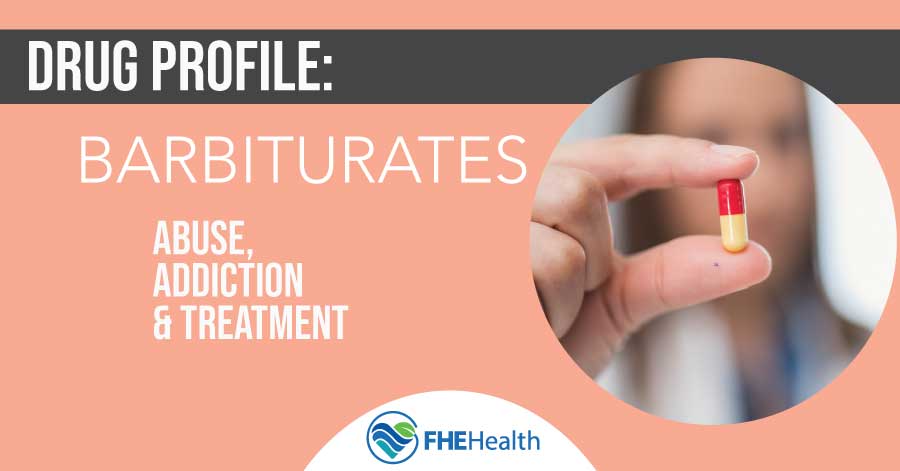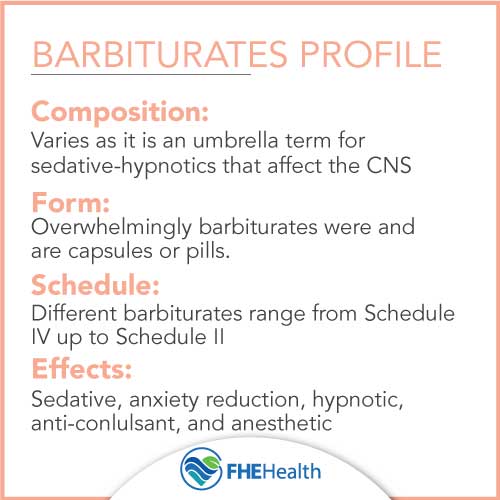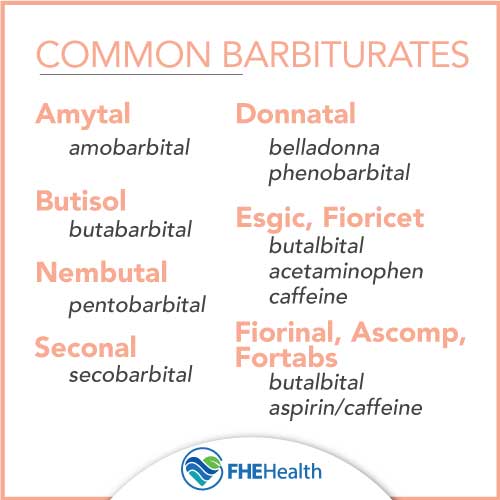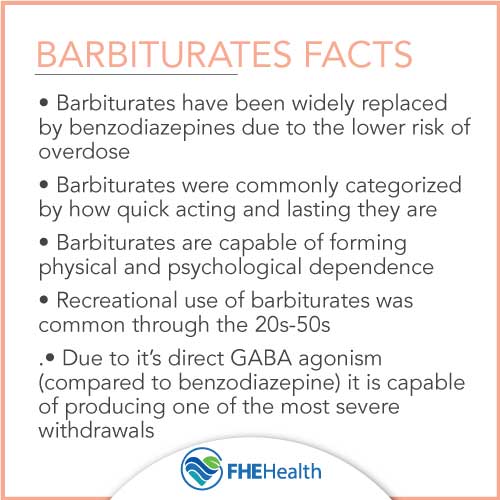
First developed in the late 19th century by Germany’s Bayer Labs, barbiturates were historically prescribed by doctors to help patients relax and fall asleep. In fact, from 1920 until about 1950, these drugs were essentially the only sedatives available. During the 1960s and 70s, barbiturates were widely used in medicine, but their use also became associated with recreational use, abuse, and addiction— even fatal overdose.
Today, doctors rely on other classes of drugs, like benzodiazepines, to achieve similar effects. Benzodiazepines, which include drugs like Ativan and Valium, are safer than barbiturates—(users are not as likely to overdose accidentally)—but they also carry a risk of dependency and addiction.
Barbiturates may not be as widely prescribed by doctors as they once were, but they are still available— and still associated with abuse and addiction. Abuse of barbiturates continues to be extremely risky. Many individuals have lost their lives to barbiturates, including well-known people like Marilyn Monroe and Judy Garland. In fact, these drugs may be even more dangerous today, as law enforcement officials have found street versions of these drugs mixed with other dangerous substances like heroin.
Overview of Barbiturates
 “Barbiturates” is an umbrella term for a group of drugs that are classed as sedative-hypnotics. They induce sleep and quell anxiety, but even a slight overdose can lead to coma or even death. Some of these drugs are fast-acting, remaining in the body for a short time, while others are long-acting— their effects might be felt for as long as two days. Some of the most commonly known—and abused—barbiturates drugs are phenobarbital, pentobarbital, amobarbital, and secobarbital.
“Barbiturates” is an umbrella term for a group of drugs that are classed as sedative-hypnotics. They induce sleep and quell anxiety, but even a slight overdose can lead to coma or even death. Some of these drugs are fast-acting, remaining in the body for a short time, while others are long-acting— their effects might be felt for as long as two days. Some of the most commonly known—and abused—barbiturates drugs are phenobarbital, pentobarbital, amobarbital, and secobarbital.
Each type of barbiturate has a slightly different effect. When used as a medication, they are intended to:
- Promote sleep
- Treat anxiety
- Reduce seizures
- Treat migraines
- Relieve muscle spasms
Many of these drugs work to treat similar issues; their main difference lies in the amount of time they remain in the body, working to achieve the desired effects.
Identifying Barbiturates
Barbiturates may be difficult to identify, because they are available in multi-colored forms. Barbiturates may be taken in tablet, capsule, liquid, or injectable forms. On the street, barbiturate drugs go by many different names—mostly in reference to their colors. Common street names for barbiturates are:
- “Reds”
- “Pink”
- “Goofballs”
- “Blue Heavens”
- “Downers”
- “Blue Devils”
- “Yellow Jackets”
- “Rainbows”
- “Pink Ladies”
- “Purple Hearts”
- “Red Birds”
Barbiturates Abuse
 Although barbiturate abuse has decreased in the last couple of decades, these drugs are still abused and sought after as recreational drugs. They produce effects that are similar to drinking alcohol. Some side effects of barbiturates abuse include:
Although barbiturate abuse has decreased in the last couple of decades, these drugs are still abused and sought after as recreational drugs. They produce effects that are similar to drinking alcohol. Some side effects of barbiturates abuse include:
- Slurred speech
- Euphoria
- Relaxation
- Loss of coordination
- Reduced inhibitions
- Impaired judgment
When the user takes these drugs by mouth, their effects can typically be felt within roughly 30 minutes. It’s important to note that the dangers barbiturates pose to users increase dramatically when taken with other substances like alcohol or other drugs. Taking these drugs for a long period of time can lead to substantial health problems that include liver damage, anxiety, chronic sleep conditions, and central nervous system damage.
Barbiturate Overdose
A person doesn’t have to be addicted to overdose on barbiturates. An overdose can occur with the first use, the fifth, the tenth— whenever the dose proves too much for the body to tolerate. Barbiturate overdose is a serious, life-threatening event. Anyone suspected of overdosing on these drugs requires immediate emergency care. Signs of a barbiturates overdose include:
- Shallow breathing
- Loss of coordination
- Extreme confusion
- Drowsiness
- Kidney failure
- Coma
The threat of overdose increases when these drugs are taken with alcohol. Barbiturate overdose can also be deadly or lead to permanent physical and mental damage.
Barbiturate Addiction
Barbiturates can be highly addictive. Users who abuse these drugs can become neurologically dependent on them. A person who develops an addiction to these drugs is likely to note significant behavioral and physical signs, including:
- Loss of focus and poor concentration
- Slurred speech
- Slow breathing
- Dizziness
- Loss of motor control
- Difficulty with urination
Many people who are addicted to drugs like barbiturates may demonstrate increased irritability, mood swings, depression, loss of interest in formerly enjoyed activities, and sleep disturbances. Experiencing withdrawal symptoms is a classic sign of substance addiction. People in withdrawal from these drugs may experience tremors, hallucinations, fever, insomnia, and even seizures.
Treatment for Barbiturate Addiction
 A person who abuses barbiturates or is addicted to them should seek professional treatment. Barbiturates are physically addictive, so detox is invariably the first step in a treatment plan. Because addiction also involves psychological and behavioral dependencies, further treatment is needed to address all of these issues. If the individual only undergoes detox alone, relapse is likely. Addiction to barbiturates or other addictive substances is a chronic condition that with professional treatment can be managed effectively. Specialists at well-known treatment centers like FHE Health offer treatments that target each dependency, helping individuals to achieve long-term recovery and prevent relapse.
A person who abuses barbiturates or is addicted to them should seek professional treatment. Barbiturates are physically addictive, so detox is invariably the first step in a treatment plan. Because addiction also involves psychological and behavioral dependencies, further treatment is needed to address all of these issues. If the individual only undergoes detox alone, relapse is likely. Addiction to barbiturates or other addictive substances is a chronic condition that with professional treatment can be managed effectively. Specialists at well-known treatment centers like FHE Health offer treatments that target each dependency, helping individuals to achieve long-term recovery and prevent relapse.
Medical Detox for Barbiturate Addiction
Medical detox is safe—and essential, as quitting cold turkey can lead to severe withdrawal symptoms such as seizures. During the detox process, healthcare professionals can treat withdrawal symptoms like nausea or intense cravings with treatments designed to greatly reduce their severity. Under medical supervision, withdrawal symptoms are less likely to lead to health complications and emergencies.
Treating the Psychological and Behavioral Components of Addiction
Medical detox is an integral part of managing an addiction to barbiturates, but it’s only part of the solution. Detox targets only the physical dimension of addiction, not the mental or behavioral dependencies. At trusted addiction treatment centers like FHE Health, certified therapists and counselors meet with clients individually and in group settings to find ways for individuals to cope with the triggers that have historically compelled them to abuse alcohol or drugs like barbiturates. For example, there is strong evidence that cognitive behavioral therapy can help individuals manage their addiction and achieve lasting sobriety.
Inpatient vs. Outpatient Treatment for Addiction to Barbiturates
FHE Health offers both inpatient and outpatient treatment programs. What program is best? That depends on your individual needs. Some people who have supportive environments at home may choose to undergo outpatient therapy for their addiction. People who have a lower risk for relapse and who want to continue to maintain their obligations like caring for family or attending work may choose the outpatient option.
On the other hand, some individuals whose cravings for the addictive substance are intense or whose condition might be more complex owing to a dual diagnosis (which includes the presence of addiction and a mental health disorder) might find the inpatient program better suited to their needs. Inpatient programs allow the individual to focus entirely on their recovery journey, without any outside distractions or temptations. At FHE Health, healthcare providers can help individuals decide which treatment plan is ideal for their specific needs.
Aftercare
People who have substance addictions don’t walk out of rehab automatically “cured”: the recovery process often continues long after the person leaves treatment. For many people, the intensive portion of therapy doesn’t provide the ongoing support they need to maintain their recovery journey. Aftercare, which can include weekly or bi-weekly counseling sessions or residing at a sober living community, can provide recovering individuals with the support they need to prevent relapse. FHE Health is committed to providing a continuum of care to support patients at whatever care level they require. With ongoing support, people in recovery are more likely to stay in recovery— and to keep their disease in check.
If you or someone you love is abusing barbiturates or has developed an addiction to them, it’s important to seek help. These drugs are immensely dangerous. Even a slight increase in dose can lead to overdose and death. The best way to overcome addiction is to learn to manage the disease through professional treatment at a healthcare center like FHE Health, which specializes in addiction medicine and mental healthcare.






